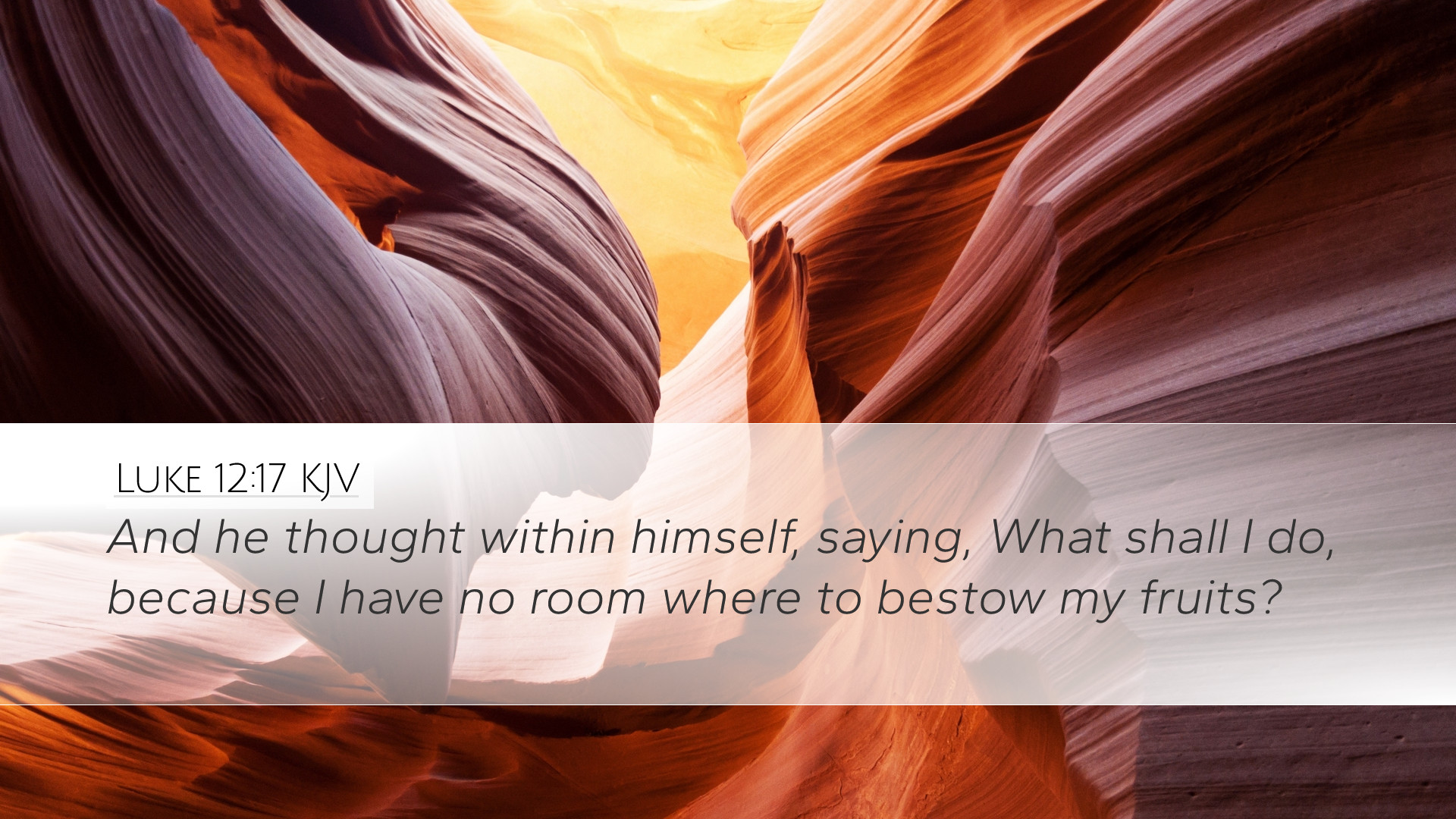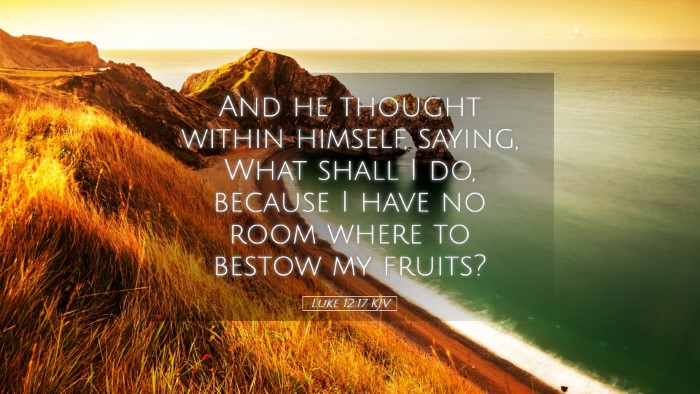Commentary on Luke 12:17
Verse Reference: Luke 12:17 - "And he thought within himself, saying, What shall I do, because I have no room where to bestow my fruits?"
Introduction
This passage forms part of Jesus’ teaching on the nature of wealth and the heart's condition regarding possessions. The parable that is encapsulated in this verse highlights the folly of laying up treasures for oneself without being rich toward God. Within this rich narrative, we find profound principles applicable to both contemporary believers and biblical scholars alike.
Contextual Background
The context of Luke 12 reveals a multitude of teachings from Jesus on various aspects of life including the hypocrisy of the Pharisees, the certainty of judgment, and the anxieties of human existence. Herein lies the parable that addresses the misguided priorities of a rich man whose concern was only for his material possessions.
Commentary Insights
1. The Internal Dialogue of the Rich Fool
As highlighted by Matthew Henry, the rich man’s reflection, "What shall I do?", emphasizes a significant self-centeredness. His thoughts are consumed by his wealth rather than considering the needs around him or the will of God. This reflects a heart turned inward, a perspective to which many can relate in the context of modern-day materialism.
2. The Mirage of Wealth
Albert Barnes expounds on the phrase, "I have no room where to bestow my fruits," noting it as a manifestation of the fleeting nature of earthly treasures. The rich man's dilemma illustrates a false sense of security found in abundance—profoundly illustrating Jesus’ later admonition in verses that follow regarding the brevity of life and the uncertainty of riches.
3. The Folly of Self-Sufficiency
Adam Clarke provides an insightful critique of the rich man's logic. Rather than seeking help from God or considering his role as a steward of God’s blessings, he resorts to his own wisdom to solve his problem. This indicates a common pitfall: making personal wealth a source of identity and self-sufficiency, which prompts God’s caution against greed and excessive attachment to material wealth.
4. The Absence of Community Concern
In this narrative, the rich man's introspection lacks community awareness. As Matthew Henry observes, there is no contemplation of sharing his bounties with the less fortunate around him. The failure to engage with community reveals a disconnect that speaks to the essence of Christian stewardship—realizing that our resources are meant to bless others, not solely to satisfy self.
5. Divine Accountability
Through this parable, there is an underlying principle of divine accountability. As per Clarke, every blessing comes with responsibility. The rich man’s amassed wealth does not insulate him from God’s scrutiny; rather, it intensifies the expectation of how those blessings should be utilized for God’s glory and others' good.
6. The Fatal Decision of the Rich Man
The rich man's decision to store his goods rather than distributing them is considered fatal. Henry discusses how this act demonstrates a fundamental disregard for the eternality of the soul over the temporality of possessions. The commentary warns that wealth can easily become an illusion, distracting one from the reality of eternal life and God’s kingdom.
7. A Contrast in Voices
This internal conflict within the rich man underscores a broader theme—the contrast between the voice of self and the voice of God. As Barnes notes, there is profound instruction in discerning whose counsel we ultimately follow. The neglect of divine dialog ultimately leads to disastrous outcomes in life choices.
Theological Implications
- The Nature of True Wealth: True wealth extends beyond material possessions; it is found in relationships with God and others.
- The Dangers of Materialism: The parable serves as a physical illustration of the spiritual dangers that accompany an excessive focus on wealth.
- Stewardship and Accountability: Believers are called to a higher standard of using blessings to reflect God’s kingdom priorities.
Application for Today
The implications of this verse speak loudly in today’s context. For pastors, it serves as a rich sermon backdrop on materialism and the Christian’s responsibility towards communal care. For students and theologians, examining this parable is critical to understanding Jesus’ views on wealth, self-reliance, and the ethos of generosity, which must characterize the life of every believer. Therefore, the challenge remains: What shall we do with our "fruits"? The correct response must involve a paradigm shift from "How can I secure my wealth?" to "How can I bless others with what God has given me?”
Conclusion
In conclusion, Luke 12:17 provides rich material for theological reflection and practical application. Through the exploration of this verse and its surrounding context, one can observe the critical tension between culture's allure of material wealth and the biblical call to a life of stewardship and generosity. The thoughts of the rich man serve as a warning, reminding us that true fulfillment lies not in hoarding, but in realizing that we are stewards of God’s blessings intended for His glory and the good of our neighbors.


